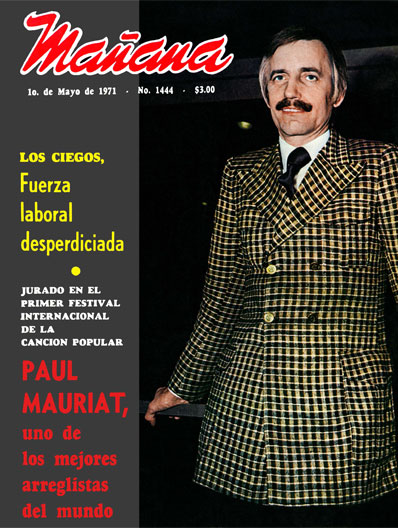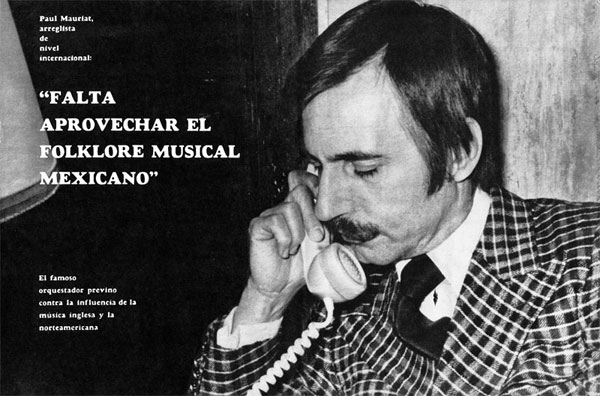INTERVIEW TO PAUL MAURIAT
by "Mañana" magazine, Mexico, May 1st, 1971
Many, many thanks to Dmitry Zhoukov for providing me this interview!
 Jury in the First International Festival of Popular Song
Jury in the First International Festival of Popular Song
PAUL MAURIAT, one of the best arrangers in the world
Paul Mauriat, arranger of international level:
"MEXICAN FOLKLORE NEEDS TO MAKE THE MOST OF IT"
The famour orchestrator warned against the influence of English and American music

He came to Mexico to take part of the jury in the First International Festival of Popular Song, and to know the local melodies.
Paul Mauriat: "Countries that have the luck to have their own folklore, such as Brazil and Mexico, should try their best to preserve it, leaving aside International styles, even if this cause them a loss in the world music market."
Sitting comfortable in a couch of the Mexican hotel where he is staying, showing real interest for the talk he is holding, Paul Mauriat - one of the best known arrangers in the world - expresses with an unmistaken French accent, his concern for the future of world folklore. Especially the one from Mexico.
Paul Mauriat: "To me, the song that won the last National Festival of Popular Song was good. The jury knew what they were doing. But - and this is a very personal opinion - I would have preferred it to be a little more Mexican. Because if a Festival has been organized here is precisely to promote the Mexican song."

But there is also an explanation for this. It becomes evident that the folklore of Mexico and the world in general, has received a strong influence of American and English music. "It's incredible - he says - that even in the farthest countries, such as Japan, American music is heard in every club. Definitively, I think it has invaded the world."
Paul Mauriat came to Mexico for two main reasons. The first one was to work as jury in the First International of Popular Song, and the second was to compile some typical Mexican songs to record them in his country.
The idea to record Latin American songs appeared last year, When he decided to performed the melody "El Triste" by Roberto Cantoral. A few months later he made a long duration record with South American music. And in past January, while he was staying in Caracas - as a special guest to a festival -, he selected some melodies that competed, to include them in his most recent record. And this time he is planning to do the same with the festival that has just ended in Mexico. Moreover, he took a record where the most important melodies that appeared, to hear it carefully in Paris.

HIS FIRST YEARS
Paul Mauriat started ten years ago, in his native Paris, to make musical arrangements. In the beginning, he was only accompanying with his orchestra to some French vedettes. Later on, he was called to accompany other first-rate artists, such as Charles Aznavour and Dalida. But three years later, his fame grew. So much that the Philips label, for his he was recording, asked him to create an orchestra that recorded exclusively for them.
Making the most of this opportunity that was offered, Paul Mauriat thought on creating an orchestra with a different sound than the others, so that people could identify them immediately. The piano and he harpsichord were his innovations and consequently, the causes that has been attributed to the success of most of his melodies.
However, that orchestral system was soon imitated. "Actually most of the American orchestras use them in their melodies. That is why I am looking for a new sound that can call for at least some time, exclusively mine."
The orchestra that conducts Mauriat consists of forty or forty and five elements.
"Never is the same number, not even the same musicians; they change constantly, because he has to bring new things to each theme that is being making." On his part, in addition to being an arranger and conductor, Paul himself plays the piano and the harpsichord, although he only does it in the rehearsals, or when there is a concert with few musicians, because it is imposible to conduct and perform at the same time.
And, outside the artistic environment, the French arranger takes a most quiet life. He is married, travels with his wife everywhere, but as long and always when there is work when he is called to do something related to music. He doesn't like to combine vacations and artistic concerts. He says that that would take away the seriousnees of the contracts offered.